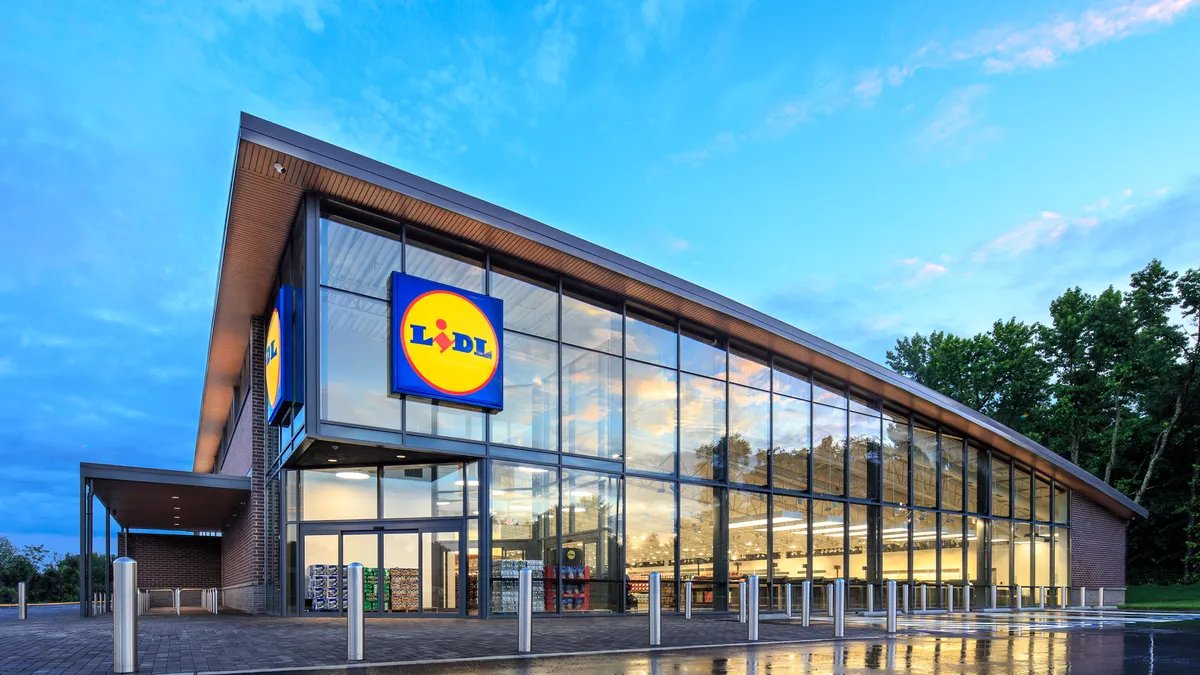Dive Brief:
- A real estate developer filed a lawsuit against Lidl, claiming the discounter wrongfully left it with “substantial financial losses” after terminating store builds in three North Carolina cities. Texas-based Leon Capital Group was in the process of building three Lidl-anchored shopping developments in Cary, Wilmington and Charlotte when the grocery chain “abruptly” terminated its purchase agreement with the firm, according to the lawsuit. Lidl declined comment, saying it does not address pending litigation.
- The lawsuit claims Lidl misrepresented its U.S. performance and expansion plans to developers like Leon Capital and left them to cover costs on projects it knew wouldn't be completed. “Lidl knew, well prior to advising Leon otherwise, that it would never construct and operate the Lidl stores in the subject developments as agreed,” the suit states. Leon Capital has asked the U.S. District Court of Eastern North Carolina to hold Lidl to its contract agreements and award the firm punitive and compensatory damages.
- Nearly one year after opening its first U.S. stores, Lidl has opened 53 out of a planned 100 stores. The company has adjusted some of its merchandising and promotional strategies. It has also added flexibility to its real estate plans to allow it to lease or buy property, and build smaller stores in addition to its 35,000 square-foot U.S. prototype.
Dive Insight:
Lidl’s U.S. entry has not gone as planned, and to date it has built just over half the number of stores it was supposed to have in place by now. That means it has had to pull out of development deals in several states, including Virginia, New Jersey and, most recently, Alabama.
This isn’t uncommon in the retail industry, as companies frequently have to adjust store growth based on financial performance and other factors. What’s notable about this lawsuit is Leon Capital Group’s claim that Lidl misrepresented its U.S. performance to the firm. According to the lawsuit, the discounter knew it wouldn’t hit its expansion goals, but still urged developers like Leon Capital to continue paving the way for its stores.
Proving deception on the part of Lidl could be a challenge, but could also have significant ramifications. If the court finds in favor of the development firm, it could open the door for lawsuits from other entities involved in Lidl developments. Lidl has stated it has more than 400 sites in various stages of development, but a spokesman for the company declined to specify store growth projections in a recent conversation with Food Dive.
Despite the slower-than-projected opening schedule, industry analysts remain bullish on Lidl’s prospects in the U.S. A consumer survey by Oliver Wyman found that Lidl inspires considerable loyalty among regular customers. Nearly half of Lidl shoppers surveyed by the firm said they visit their local store at least twice a month, while 61% of those under age 45 said they visited Lidl multiple times a month. More than half of these younger shoppers — 53% — spend $50 or more every time they go to Lidl, the study found.
Meanwhile, consulting firm Brick Meets Click reported this week that consumers are coming around to Lidl’s price-meets-value proposition and are increasingly likely to recommend the discounter to others. To improve its footing in the U.S., the firm noted, Lidl needs to keep its prices low, improve its image as a convenience retailer, and drive trial of its many private label products.
“We are bullish on Lidl and think that despite a rockier start than expected, there are good reasons to expect that Lidl and Aldi will grow their combined market share and increase pressure on both traditional retailers and name brands,” Bill Bishop, chief architect at Brick Meets Click, wrote in a blog post.










